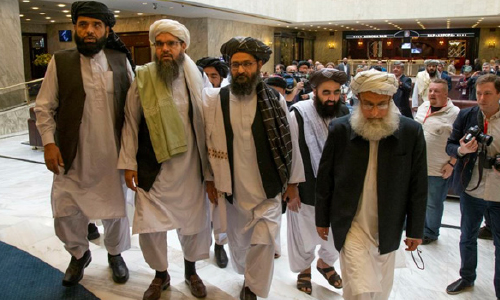It is said that the seventh round talks between the US negotiators and the Taliban members in Doha, will take place in few next days hoping that this time the talks would produce sensible results. The US forces withdrawal from Afghanistan, counterterrorism assurances, ceasefire and direct talks between the Afghan government and the Taliban are the main key issues which have been discussed in the past six rounds of the talks between US and Taliban. According to local Analysts familiar with Doha talks and the peace process, the Taliban will be given “a number of privileges” in this round of the talks. “The Americans have decided to give the Taliban some privileges to take the negotiations out of the current situation,” quoted from Wahid Muzhda, a Kabul-based political analyst.
However, there is also some pessimism as the peace talks have been faced with many deadlocks over the past seven months since Khalilzad started his efforts on behalf of the US government. Last time in May, Khalilzad said the talks are making “slow” but “steady” progress. Preparing for the seventh round talks, last week he arrived in Kabul and since then he has held consultations and talks with Afghan government leaders and members of the civil society, the youth and women. According to reports, another meeting on Afghan peace will be held in Norway after the US-Taliban talks in Doha. It is said also that the former spy chief and a vice presidential candidate Amrullah Saleh and head of President Ghani’s office, Salam Rahimi, have been invited to the Norway meeting.
On the other side, Taliban has refused to attend the meeting due to the possible presence of the two key officials. Khalilzad said in a tweet on Friday that Norway has a long-standing history in helping Afghanistan and great expertise in facilitating negotiations. The US envoy said that intra-Afghan peace negotiations could benefit from Norway’s support. The Taliban’s willingness and refusals on attending meetings on peace has created doubts among critics and some lawmakers, who say the group does not seem “interested in peace”. It is also said that Taliban are not the genuine negotiator for peace talks and they are always steered by outsiders.
In the second round of talks between the Taliban and Afghan political figures in Moscow, the Taliban negotiators insisted on the full withdrawal of US troops. Fawzia Kofi one of the Moscow meeting participants said that Taliban’s dogmatic mentalities have not changed yet. Thus, the Taliban have not accepted democracy and they have not shown any green signal to an end in the war or to a ceasefire; once they divulged their intention with saying to abolish the Afghan national army but later retreated from position due to confrontation with public criticism inside Afghanistan.
Moreover, according to sources the Taliban will only focus negotiation over foreign troops’ withdrawal from Afghanistan in return for their pledge not to welcome foreign extremists. Experts believe that the Taliban delegation will not negotiate over internal issues even if Khalilzad bring the issue of ceasefire and intra-Afghan dialogue up at the meeting.
Nevertheless, the US negotiator, Khalilzad, seems optimistic as recently said that in the upcoming meeting with Taliban he would “try to bring the first two parts of our peace framework to closure.’ Though he emphasized the success would require other parties to show flexibility. He also stressed that all talks would take place in accordance with the principle that “nothing is agreed until everything is agreed”. According to most Afghan people and analysts without intra-Afghan dialogue, peace is not possible in Afghanistan. Afghan people are not willing to desist from the democratic achievement hardly attained in last 18 years.
Simultaneous to this, a US military commander noted this week that strongholds of the Islamic State group in eastern Afghan provinces “are very worrisome to us. While the Taliban spokesman Zabihullah Mujahid claimed that Taliban had cleared many Afghan areas of IS, and he accused American forces as well as their local partners of launching aerial strikes against Taliban positions in areas where the insurgents are battling IS militants. “If American generals really fear from Daesh, then why are they avoiding its elimination and creating hurdles against mujahedeen operations,” quoted from Mujahid.
Overall, there are several challenges in Afghanistan peace process. First, the Afghan government and some regional stakeholders have been marginalized in the talks between the Taliban and US representatives. If this one-to-one talks reach deadlock, there is no third party around the table to push for breaking. It is believed that engaging regional actors and the Kabul government would make the talks inclusive and productive.
Second, the Taliban are simply pushing for their demands without considering the demand of people and government of Afghanistan. Although the Taliban negotiators had been delisted from the blacklist, the US troop pullout had been agreed, and some of their prisoners released but the Taliban has accepted not a single demand of their interlocutors and have intensified their attacks in recent months.
Third, instead of siding with Washington in the talks, Russia continues a parallel negotiation to Doha talks through inviting the Taliban and US political and Jihadi leaders every once in a while. This would contribute to the Taliban’s international recognition and boosts their morale for fighting. It implies that Moscow is showing Washington that it has leverage on the Taliban or close tie with their leadership simply to urge the US indirectly to withdraw its troops from Afghanistan.
Home » Opinion » Pessimism and Optimism on the Eve of Seventh Round Talks Between US and Taliban
Pessimism and Optimism on the Eve of Seventh Round Talks Between US and Taliban
| Mohammad Zahir Akbari

